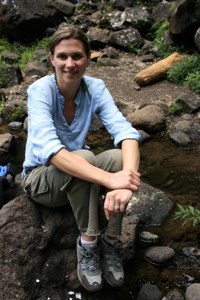Research Emphasis:
My research focuses on the ecology and biogeochemistry of coastal wetlands and estuaries. Elucidating controls on coastal ecosystem functioning is critical because these systems provide human societies with economically valuable services and are important, but poorly constrained, components of the global carbon cycle. Estuaries and wetlands are biologically, chemically, and physically complex environments that are acutely impacted by human activities. Disturbances such as nutrient pollution, over-fishing, and climate change fundamentally alter how estuaries and wetlands function and interact with the coastal ocean. Because efforts to reverse or remediate the effects of disturbances can further perturb fragile wetlands and estuaries, a key unknown is whether impacted habitats can be restored to pre-disturbance conditions. Through my research, I seek to develop an integrated understanding of ecosystem biogeochemistry and ecology in order to refine the role of estuaries and wetlands in the global carbon cycle and predict the likelihood of recovery from human disturbances. I use innovative geochemical tracer approaches in combination with mesocosm and landscape scale experiments to quantify carbon pathways, transformations, and fate in wetland and nearshore habitats and evaluate the effects of human disturbances. By taking an interdisciplinary approach, my research has demonstrated that ecological communities have profound effects on sediment biogeochemistry and, as a result, coastal carbon cycling and ecosystem responses to anthropogenic disturbances.
GCE Committees:
GCE Predator Exclusion Experiment Committee, GCE Disturbance Committee, GCE Flux Tower Committee, GCE Executive Committee
Contact Information:
Primary Organization: University of Georgia
Mailing Address:
Dr. Amanda C. Spivak
Marine Science Rm. 164
Marine Sciences
University of Georgia
Athens, Georgia 30602-3636
Office Phone: (706) 542-5709
E-Mail: aspivak@uga.edu
Web Page: http://www.marsci.uga.edu/directory/people/amanda-spivak
Other Identity Systems:
ORCID: orcid.org/0000-0001-6743-0783
GCE Data Sets:
ORG-GCED-2404 (Decomposition, porewater, plant and animal collection, and soil temperature data in Airport Marsh, Sapelo Island, 7/2019-7/2020)
MSH-GCET-2305 (Characterizing the ecology and soil biogeochemistry of wetland transition zones along the Satilla River Estuary, GA, USA.)
ORG-GCEL-2212 (Experimental soil metabolism responses to oxygen availability and carbon pulses)
Journal Articles
Reddy, S., Farrell, R., Wu, F., Pennings, S.C., Sanderman, J., Eagle, M., Craft, C.B. and Spivak, A.C. 2025. Decomposing the Tea Bag Index and finding slower organic matter loss rates at higher elevations and deeper soil horizons in a minerogenic salt marsh. Biogeosciences. 22:435-453. (DOI: 10.5194/bg-22-435-2025)
Hill, K. and Spivak, A.C. 2024. Blue Carbon and Wetlands Compensatory Mitigation: Fitting a Climate-Sized Peg into a Watershed-Sized Hole. Sea Grant Law and Policy Journal. 13:31.
Koontz, E.L., Parker, S.M., Stearns, A.E., Roberts, B.J., Young, C.M., Windham-Myers, L., Oikawa, P., Megonigal, P., Noyce, G.L., Buskey, E.J., Derby, R.K., Dunn, R.P., Ferner, M.C., Krask, J.L., Marconi, C.M., Savage, K.B., Shahan, J., Spivak, A.C., St. Laurent, K.A., Argueta, J.M., Baird, S.J., Beheshti, K.M., Crane, L.C., Cressman, K.A., Crooks, J.A., Fernald, S.H., Garwood, J.A., Goldstein, J.S., Grothues, T.M., Habeck, A., Lerberg, S.B., Lucas, S.B., Marcum, P., Peter, C.R., Phipps, S.W., R
Mariotti, G., Ceccherini, G., Alexander, C.R. Jr. and Spivak, A.C. 2024. Centennial Changes of Salt Marsh Area in Coastal Georgia (USA) Related to Large-Scale Sediment Dynamics by River, Waves, and Tides. Estuaries and Coasts. 47:1498 - 1516. (DOI: 10.1007/s12237-024-01383-2)
Bowen, J.L., Spivak, A.C., Bernhard, A.E., Fulweiler, R. W. and Giblin, A.E. 2023. Salt marsh nitrogen cycling: where land meets sea. Trends in Microbiology. (DOI: 10.1016/j.tim.2023.09.010)
Holmquist, J., Klinges, D., Lonneman, M., Wolfe, J., Boyd, B., Eagle, M., Sanderman, J., Todd-Brown, K., Belshe, E., Chapman, S., Corstanje, R., Janousek, C., Morris, J., Noe, G., Rovai, A., Spivak, A.C., Vashen, M., Windham-Myers, L., Kroeger, K.D. and Megonigal, P. 2023. The Coastal Carbon Library and Atlas: Open source soil data and tools supporting blue carbon research and policy. Global Change Biology. 30(1). (DOI: 10.1111/gcb.17098)
Spivak, A.C., Pinsonneault, A.J., Hintz, C., Brandes, J. and Megonigal, P. 2023. Ephemeral microbial responses to pulses of bioavailable carbon in oxic and anoxic salt marsh soils. Soil Biology and Biochemistry. 185. (DOI: 10.1016/j.soilbio.2023.109157)
Wu, F., Pennings, S.C., Ortals, C., Ruiz, J., Farrell, W.R., McNichol, S.M., Angelini, C., Spivak, A.C., Alber, M. and Tong, C. 2021. Disturbance is complicated: headward-eroding saltmarsh creeks produce multiple responses and recovery trajectories. Limnology & Oceanography. 67:S86-S100. (DOI: 10.1002/lno.11867)
Spivak, A.C., Sanderman, J., Bowen, J.L., Canuel, E.A. and Hopkinson, C.S. 2019. Global-change controls on soil-carbon accumulation and loss in coastal vegetated ecosystems. Nature Geoscience. 12:685–692. (DOI: https://doi.org/10.1038/s41561-019-0435-2)



